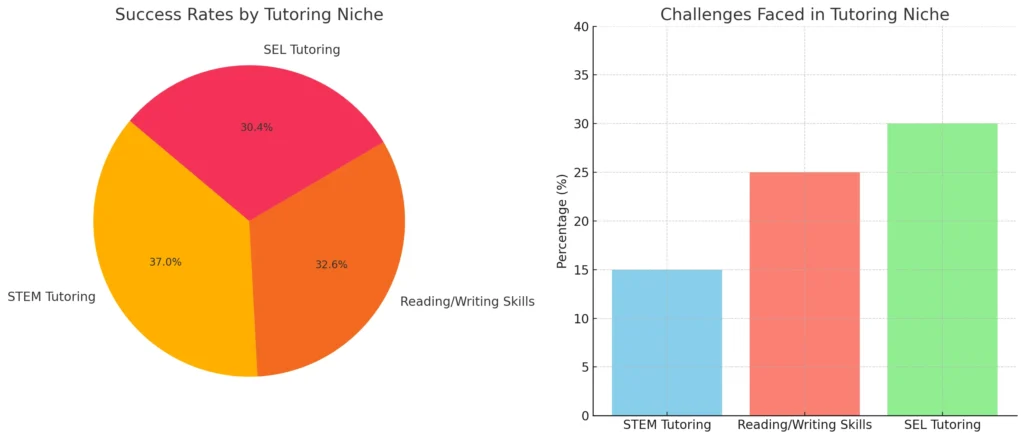In today’s fast-paced world, parents are increasingly seeking personalized educational support to enhance their children’s learning experiences outside the traditional classroom. Home tutoring for kids has emerged as a thriving industry, driven by parents’ desire for tailored attention and specialized instruction to meet each child’s unique needs. Whether it’s foundational support in math, creative arts, or developing essential study skills, starting a home tutoring business for kids offers a rewarding and profitable venture for aspiring entrepreneurs. With projected growth rates in tutoring services consistently rising, now is an opportune time to explore innovative ideas in this field.
| Metric | Value |
|---|---|
| Current Market Size | $100 billion globally |
| Annual Growth Rate | 7% per year |
| Projected Growth Rate (2024-2029) | 8.5% per year |
| Key Regions with High Demand | North America, Asia-Pacific |
| Popular Subjects | Math, Science, Language Arts |
Why Choose Home Tutoring for Kids?
The demand for personalized and flexible learning solutions has skyrocketed, making home Ideas for Tutoring and Education Business Startups. In a time when educational needs vary widely among children, home tutoring fills the gap by providing focused, individualized support tailored to each child’s pace, strengths, and challenges. For parents, the appeal lies in the ability to provide their children with one-on-one attention that complements school learning and boosts overall confidence.
Starting a home tutoring business is not only a profitable venture but also one that allows you to make a genuine impact on young minds. The market is constantly expanding due to rising awareness among parents about the importance of customized learning. Additionally, advancements in digital tools have made it easier than ever to enhance lesson quality, track progress, and cater to unique learning needs, further boosting the tutoring sector’s growth potential.
Also read ; – Top 10 Ideas for Home Renovation Consulting Business Startups in 2025
Current Trends and Future Opportunities in Home Tutoring
| Trend/Technique | Description | Impact on Learning |
|---|---|---|
| STEAM Tutoring | Focus on Science, Tech, Engineering, Arts, and Math | Prepares kids for future job skills and innovation |
| Language Tutoring | Emphasis on multilingual skills and language comprehension | Enhances communication and cognitive abilities |
| Social-Emotional Learning | Teaching resilience, empathy, and emotional regulation | Builds interpersonal skills and emotional intelligence |
| Hybrid Tutoring Models | Combination of in-person and online sessions | Offers flexibility and more engagement opportunities |
| Personalized Learning Paths | Customized lesson plans based on individual needs | Increases effectiveness and addresses learning gaps |
The home tutoring industry for kids is evolving rapidly, driven by the need for adaptive, specialized learning experiences. One significant trend is the rise of STEAM-focused tutoring (Science, Technology, Engineering, Arts, and Mathematics), reflecting parents’ and educators’ growing focus on equipping children with skills for the future. Additionally, there’s been an increased demand for language tutoring and social-emotional learning—helping kids not only with academic success but also with building resilience, communication skills, and emotional intelligence.
Personalized Learning Paths are another trend reshaping the field. Leveraging digital tools, tutors now create individualized lesson plans, monitor student progress in real-time, and adapt lessons based on each child’s pace and learning style. This customization ensures that children receive the exact support they need, whether for advanced topics or foundational skills, making home tutoring highly effective.
Looking to the future, hybrid tutoring models—which combine in-person and online sessions—are likely to expand. Hybrid tutoring brings the best of both worlds: it offers the flexibility of virtual learning with the tangible benefits of face-to-face interaction, making it ideal for busy families. As digital tools continue to improve, home tutoring businesses that embrace tech-driven solutions and a flexible approach are set to thrive in the coming years.
Top 10 Ideas for Home Tutoring for Kids Business Startups
Launching a home tutoring business for kids opens up a range of opportunities to cater to specific learning needs. Here are ten innovative and profitable ideas for home tutoring services that can help make learning both enjoyable and effective for children.
| Tutoring Idea | Target Age Group | Estimated Startup Cost | Profit Potential |
|---|---|---|---|
| STEM Tutoring | Middle to High School | Moderate | High |
| Language Tutoring | Elementary to Middle School | Low | Moderate |
| Reading and Writing Skills | Kindergarten to Middle School | Low | High |
| Math Mastery Tutoring | Elementary to High School | Low to Moderate | High |
| Social-Emotional Learning (SEL) | All Ages | Moderate | Moderate |
| Art and Creativity Tutoring | Younger Children | Moderate to High | High |
| Music Lessons | Elementary to Middle School | High | High |
| Science Experiments | Middle School | Moderate to High | Moderate |
| Test Preparation Tutoring | High School | Moderate | High |
| Homework Help and Study Skills | All Ages | Low | Moderate |
1. STEM Tutoring
- Why: STEM subjects are critical in today’s world, and parents recognize their value.
- Startup Requirements: A solid background in science and math, engaging lesson materials, and potentially some basic scientific equipment.
- Target Market: Middle school to high school students.
- Estimated Costs: Moderate, depending on subject complexity and materials.
2. Language Tutoring
- Why: Multilingual skills are increasingly in demand for cognitive and cultural benefits.
- Startup Requirements: Proficiency in the language taught, interactive resources, and cultural insights.
- Target Market: All ages, particularly elementary and middle school students.
- Estimated Costs: Low, as most resources are digitally available.
3. Reading and Writing Skills Coaching
- Why: Foundational literacy skills are crucial for academic success.
- Startup Requirements: Knowledge of phonics, grammar, and creative writing techniques.
- Target Market: Kindergarten to middle school students.
- Estimated Costs: Low, with initial investment in books and reading materials.
4. Math Mastery Tutoring
- Why: Math can be challenging, but essential, for many children.
- Startup Requirements: Strong math background, problem-solving tools, and creative techniques.
- Target Market: Elementary to high school students.
- Estimated Costs: Low to moderate, depending on the level of math.
5. Social-Emotional Learning (SEL) Coaching
- Why: SEL helps kids develop resilience, empathy, and social skills.
- Startup Requirements: Knowledge in child psychology or SEL practices, resources for activities.
- Target Market: All ages, especially younger children.
- Estimated Costs: Moderate, based on resources used.
6. Art and Creativity Tutoring
- Why: Creativity enhances problem-solving and emotional expression.
- Startup Requirements: Artistic skills, a variety of art supplies, and a creative environment.
- Target Market: All age groups, especially younger children.
- Estimated Costs: Moderate to high, depending on materials.
7. Music Lessons
- Why: Learning music can improve memory, coordination, and discipline.
- Startup Requirements: Musical expertise, access to instruments, and lesson materials.
- Target Market: All ages, particularly elementary and middle school students.
- Estimated Costs: High, if instruments are provided.
8. Science Experiments and Exploration
- Why: Hands-on science sparks curiosity and deepens understanding.
- Startup Requirements: Science background, safe experiment kits, and a space for demonstrations.
- Target Market: Middle school students.
- Estimated Costs: Moderate to high, depending on experiment kits.
9. Test Preparation Tutoring
- Why: Standardized test performance impacts academic trajectories.
- Startup Requirements: Familiarity with test formats, practice exams, and effective study strategies.
- Target Market: High school students.
- Estimated Costs: Moderate, mainly for practice materials.
10. Homework Help and Study Skills Coaching
- Why: Strong study habits are foundational for academic success.
- Startup Requirements: General academic knowledge, time management skills, and study strategies.
- Target Market: All ages.
- Estimated Costs: Low, requiring minimal initial investment.
Read more : – How to Create an Educational App like Masterclass? (Step-by-Step Guide)
Real-World Examples
The home tutoring industry has seen remarkable success stories, with many entrepreneurs finding unique ways to make a lasting impact. By tailoring their services to specific needs and staying responsive to industry trends, these startups demonstrate the potential within this field.
One successful example is of a tutoring service that focuses solely on STEM education for kids. Recognizing the growing emphasis on STEM skills, this business crafted hands-on experiences in math, science, and technology to engage children’s curiosity. They integrated basic robotics kits and coding tools into their sessions, which not only made learning fun but also gave students practical skills. Their approach resonated with parents looking to prepare their kids for the future, resulting in a growing client base and steady revenue.

Another innovative example is a reading and writing skills tutor who works with young learners to improve literacy. They use creative storytelling techniques, allowing kids to write and illustrate their own stories, which has been especially effective for engaging reluctant readers. By combining art and language, this approach has won the hearts of both students and parents, creating a unique brand identity.
Finally, a tutor specializing in social-emotional learning (SEL) has made waves by addressing an often-overlooked area of childhood development. This tutor incorporates activities that teach emotional awareness, empathy, and conflict resolution, equipping kids with essential life skills. The tutor’s holistic approach has gained widespread appreciation, leading to a loyal client base and strong referrals.
Mistakes to Avoid When Starting a Home Tutoring Business
Starting a home tutoring business can be incredibly rewarding, but success requires careful planning and a clear understanding of potential pitfalls. Here are some common mistakes new tutors face and ways to prevent them, helping you build a trusted and reliable tutoring brand.
| Common Mistake | Preventive Measure |
|---|---|
| Ignoring Individual Learning Styles | Assess each student’s learning style and adapt your approach |
| Overloading Schedules | Set a manageable schedule with balanced student hours |
| Lack of Communication with Parents | Provide regular progress updates and involve parents in goal-setting |
| Not Setting Clear Boundaries | Establish guidelines for scheduling, cancellations, and payments |
| Underestimating Startup Costs | Budget realistically for materials, software, and technology upgrades |
1. Ignoring Individual Learning Styles
Each child learns differently, whether they are visual, auditory, or kinesthetic learners. Failing to adapt lessons to suit a child’s preferred learning style can lead to disengagement. Successful tutors assess a student’s strengths and adjust their approach accordingly to enhance the learning experience.
2. Overloading Schedules
Many new tutors take on too many students in an attempt to grow quickly, which can lead to burnout and impact lesson quality. Building a manageable schedule with set hours ensures that you can give each student the attention they deserve, ultimately improving outcomes and preserving your energy.
3. Lack of Communication with Parents
Parents are key stakeholders in the success of a tutoring business. Tutors who fail to communicate regularly with parents miss an opportunity to gain insights, get feedback, and foster trust. Schedule brief updates to keep parents informed of their child’s progress and involve them in setting learning goals.
4. Not Setting Clear Boundaries
For home-based tutoring, maintaining professional boundaries is essential. Setting clear guidelines on scheduling, cancellations, and payment policies ensures a smoother business relationship. This also helps tutors to manage their time effectively and prevents misunderstandings.
5. Underestimating Startup Costs
While home tutoring generally has lower overheads, there can still be costs for materials, software, or technology upgrades. Budgeting carefully from the start and being realistic about initial expenses will allow your business to grow sustainably without financial strain.
Why Trust Miracuves Solutions for Your Next Project?
Choosing the right partner is essential when launching a successful home tutoring business. Miracuves Solutions understands the unique challenges and opportunities in today’s tutoring landscape, offering the expertise and tools needed to turn your vision into reality. With a strong track record of delivering cutting-edge app solutions and digital platforms, Miracuves Solutions is dedicated to helping entrepreneurs build seamless and innovative tutoring services.
Our team specializes in creating intuitive applications that support personalized learning paths, progress tracking, and engaging user interfaces tailored specifically for kids’ education. We believe that technology should enhance the tutoring experience without complicating it, which is why our solutions are user-friendly, efficient, and designed for scalability. This means your business can grow smoothly as your client base expands, adapting to new demands and technologies.
Miracuves Solutions prioritizes client success by ensuring our solutions align with your goals, budget, and vision. With our expertise, you’ll have the resources to build a trusted tutoring brand that not only stands out in a competitive market but also makes a lasting impact on young learners.
Conclusion
Home tutoring for kids presents an exciting opportunity to create a meaningful and profitable business in a field that is only expected to grow. By choosing the right niche, understanding your audience, and staying mindful of the latest educational trends, you can build a tutoring business that not only helps students excel academically but also empowers them with skills for lifelong success.
Starting with a clear plan and a commitment to providing high-quality, personalized learning experiences will set your business apart. Whether focusing on foundational skills or innovative subjects like STEM and social-emotional learning, your tutoring services can make a significant difference in each child’s life. Take the first step toward launching a fulfilling and rewarding venture that meets the demands of modern education.
FAQs
What qualifications do I need to start a home tutoring business?
While formal qualifications can help, they aren’t always required. Experience in teaching, a strong grasp of the subject matter, and effective communication skills are often enough to begin.
How much should I charge for home tutoring?
Rates vary by location, subject, and expertise. Research local market rates, typically ranging from $20 to $80 per hour, and set prices that reflect your experience and the demand in your area.
What’s the best way to attract clients for my tutoring business?
Word of mouth, local advertisements, and social media can help attract clients. Building an online presence or creating a website also increases visibility and credibility.
Can I tutor students online as well as in person?
Yes! Many tutors now offer a mix of in-person and online sessions to accommodate different schedules and preferences, reaching a wider audience and offering more flexibility.
What tools are essential for a home tutoring business?
A reliable computer, educational materials, and any subject-specific tools are essential. For online tutoring, a high-speed internet connection, virtual whiteboard, and video conferencing software are key.
Related Articles:
Most Profitable Education Apps to Launch in 2025
How to Create an Educational App in 2025 – Complete Guide
Most Profitable Freelance Apps to Launch in 2025
Top 10 Ideas for Babysitting and Child Care Business Startups








